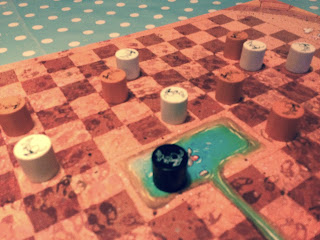The next night I watched a play through of Mombasa and realised that, despite it's high rating on BGG, it looked rather too Feldy even for me. So today I took that back and exchanged it - this time for two (one new, one second-hand) games that Andrew and I played tonight. I also rented a game that the ship refused to sell...
Here's how the games rated with us.
sniffy chieftain
Pueblo was a Kramer and Kiesling creation from the early 90s that was possibly inspired by Tetris. The players are constructed a 'pueblo' for tenancy and the chieftain strides around the complex making sure you're not making your own colours (rather than his preferred neutral colour of beige) stand out too much. Despite the potentially high AP factor it played reasonably quickly - I did well during the building, but at the end of the game the chieftain makes a final inspection, and at that point I came spectacularly undone:
Andrew - won convincingly
Sam - lost convincingly
Next up was Billabong, the rental. This is like a less-boring Chinese Checkers - or a less random Camel Up - as players race their kangaroos around an oasis, trying to be the first to get all their kangaroos 'home'. Kangaroos can move one space at a time, but they can also jump. The catch - or the advantage - here is that they can jump over another kangaroo for as many spaces as they are behind it - thus (as long as there is space on the board) a kangaroo three, four or six spaces behind yours can jump three, four, or six spaces in front of it. And as you can jump backwards, diagonally, and multiple-y, it was deceptively thinky too.
go let it out
Andrew - lost
The final newbie was Knitwit, Matt Leacock(Mr Pandemic)'s attempt at a Codenames-style word association - without clues this time. Players add a loop to an expanding board with a word attached, and after that, a spool - each spool ends up with at least one (or two, or three) word to define it. Players then write a definition of each spool: for instance, my living, slow and moving word was Sloth. My electrical word was Dishwasher. And so on. But speed also plays a part, and Andrew defined all the words way before I did:
Andrew 12
Sam 9
words
We both really liked it, but thought it'd be better with more players.
There was just time to bash through that snappy game of Russian Railroads (I won) and several games of Cube Quest (Andrew won most of them, although I beat him once by trying to flick his grunt off and careering down the table into his King...) before calling it a night.





I was thinking about blogging, just because tonight reminded me of how much I love board games.
ReplyDeletePueblo is an interesting abstract puzzle/strategy game and I was convinced I was stoney last until the final round of scoring put me in a comfortable first place. It was a nice game, with two defence mechanisms: put down a neutral piece or move the cheiftain past your conspicuous tower of coloured blocks. It'd be interesting to see how it plays with more than two.
Billabong is, I suspect, maybe best with two. Or three at a pinch. For such a smiple game, it's big on AP. It reminded us at the time of Chinese Checkers, but also with a little reflection, I think it resembles one of Knizia's New Games In Rome mini-games: the chariot one. Very neat and devious. It is, however, possible to tell when you've lost long before the game is over which might make things awkward in multi-player games. I resigned, as Sam says, with three unfinished kangaroos to Sam's one.
Knitwit was a joy, but definitely not a two-player game. I'm quite proud of my choice of "absinthe" for the descriptors "blue" and "sharp". But given that it takes a while to place the loops and bobbins and descriptors, there's enough time to come up with answers before the guessing time begins, meaning it can be little more than a speed-writing competition. This game is ripe for house rules, I believe.
In Russian Railroads, I decided to try and get some points off the centre track with its tasty "x2" multiplier, but I didn't seem to have enough time. One more round, and I would've hit pay dirt. But with Sam on 200 and something and me on 190 something, it was quite a low scoring game.
And Cube Quest. It's a kind of instant luck generator. I won one round by hitting one of Sam's cubes and then my grunt span up into the air before landing on the corner of Sam's king, which was then gently nudged off the play mat. By the end, the game was more notable for Sam's attempts at catching cubes before they hit the floor, which usually involved some kind of juggling display before he finally dropped it. At least once he ended up on the floor himself.
Crazy days.
Kremlin definitely wouldn't have been your thing and Mombasa definitely wouldn't have been mine. Pueblo is great though, and I've been really wanting to try Knit Wit.
ReplyDeleteSo well done for getting it right in the end :)
Yeah much as I like Feldian systems and engine building Mombasa looked a step too far. Enjoyed all the new games considerably!
ReplyDeleteIf you want to try Kremlin then I happen to own a copy...
ReplyDeleteYou need a short egg timer for Billabong - before the sand runs out the first time you must have selected which piece you are going to move, and you have to have moved it before the sand runs out again.
ReplyDeleteAha! That sounds like a good addition Andy. The copy I have doesn't have one...
Delete